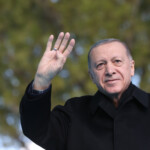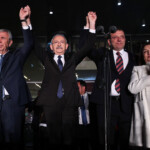Kilicdaroglu’s public discussion of his Alevi identity may prevent Erdoğan from exploiting his status as a religious minority and using it against him in the upcoming election.
“Dear Young First-Time Voters, the time has come for me to talk about a very private, sensitive matter: I am an Alevi, I am a Muslim,” Turkish opposition leader Kemal Kilicdaroglu revealed in a video released last Wednesday that drew more than 75 million viewers.
The revelation involves a lot more than coming out of the religious closet. His religious identity was known, even if he refused to discuss it publicly. Now that he has, Kilicdaroglu has set off a social and political upheaval.
Journalists called it a “historic announcement,” while political opponents praised his courage. The leader of the Kurdish party HDP tweeted: “I wholeheartedly support this beautiful statement.” The head of the Future party, Ahmet Davutoğlu, who left the ruling party to join the opposition, declared that “I am Sunni. But it is my duty to protect our Alevi citizens.”
It is difficult to say how the opposition leader’s announcement will affect the May 14 election for president and parliament, but Kilicdaroglu has already won one clear victory: He deprived Turkish President Recep Tayyip Erdogan of the ammunition he has used against his rival by asserting that as an Alevi, Kilicdaroglu was not a true Muslim.
Being an Alevi in Turkey means belonging to a large but amorphous minority whose exact numbers are not known, as membership in the community is not listed in Turkish identity documents. Estimates are that the community numbers 10 million to 15 million people, perhaps more.
The Alevi faith in Turkey rests in part on the foundations of Shi’ism, which recognizes the Prophet Muhammad but considers Ali to be his rightful successor. Their customs are different from those of other Muslims. Among other things, they do not fast during Ramadan, women and men pray together, and alcohol is not strictly prohibited. Prayers are held in meeting houses and not in mosques.
However, the Alevis are not recognized in Turkey as a religious movement, so they are neither entitled to state support nor are they exempt from fees and taxes as are recognized religious institutions such as mosques, synagogues and churches.
***
Over the decades, Alevis have been reluctant to acknowledge their identity publicly. “Being an Alevi is worse than being a Kurd or an Arab,” said one member of Erdogan’s AK Party. “The Kurds and the Arabs at least are Muslims, the Alevis are irreligious idolators.” That claim, however, is not correct: Many of the members of the community are both Kurds and Alevis.
The exposure of the opposition leader’s Alevi identity will not necessarily improve the formal status of the Alevis in Turkey. It is extremely doubtful that Erdogan will rush to give them the status of a recognized religion, and compete with his rival in a sector that was considered to be his home turf.
Incidentally, many Alevis supported Erdogan in the previous elections, even though it is hard to estimate the level of their support for him, because no official ethnic listings exist. But the great publicity given to Kilicdaroglu’s announcement and the public support for it have breathed new life into identity politics in Turkey, and added the Alevis as a community with status and power in the competition for control of the government.
If over the past two decades, when Erdogan ruled the country, the Kurds were the sole ethnic group that used their ethnic identity for political purposes, now the Alevi identity, whose foundations are religious and not ethnic, has joined the political competition too. This could very well force Erdogan to reformulate, or at least moderate, the fundamentally Sunni religious nationalism he promotes.
This need is growing in light of the latest opinion polls, which predict a significant decline in the strength of the ruling Justice and Development Party – and of Erdogan himself.
Some of the polls forecast a second round of balloting in the presidential election, while for the parliamentary elections, which for the first time will be held on the same date as the presidential election, Erdogan’s present government coalition may well not be able to form an agreed-upon government.
The problem, which the polls reflect, is that most of the public still does not see Kilicdaroglu as a clearly preferred candidate for saving the country from the harsh economic crisis it has been wallowing in for the past five years.
This is a shorter version of an article that was originally published by Haaretz.
The views and opinions expressed above are the author’s and do not represent those of the Free Turkish Press.


